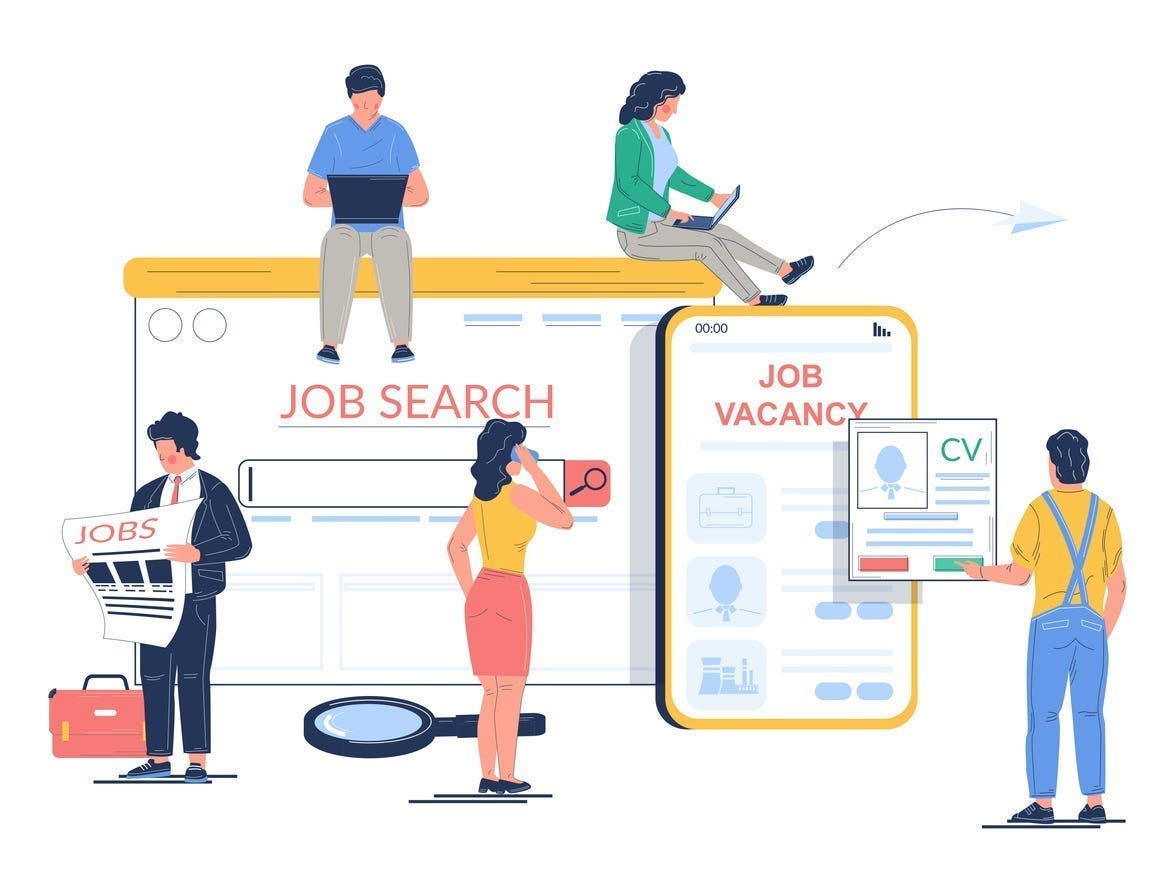Are You Wasting Time Searching for Jobs in the Wrong Places?
If you’re searching for jobs online right now, your biggest problem might be where to start. LinkedIn, Indeed, niche job search sites, employer websites—there are hundreds, perhaps thousands, of apps, sites, and angles to try.
The problem, of course, is that you only have so much time and energy to spend on your job hunt, even if you’re devoting full-time working hours to the search. It’s easy to squander your valuable job search time on the wrong channels—or too many of the right ones.
To make the best use of your resources, you need to know what each job search tool does best. Then you can focus your efforts on the channels that make the most sense for your specific needs.
LinkedIn
Best for: When you have a connection or want to link up with a recruiter.
LinkedIn has over 1 billion users, with 200+ million in the U.S. But if you’re looking for work, you’re probably more interested in the fact that the professional social network also has millions of open jobs. There’s also a lot of competition, with LinkedIn reporting that 9,000 users apply for a job, and only seven are hired every minute.
When should you use LinkedIn to find these jobs? When you have a contact that can connect you with someone who works for an employer that’s hiring. To do that, click on the Jobs tab at the top of each page, then search for jobs by title, skill, or company, plus location. When you click into each listing, you’ll be able to see if you have any connections at the company.
Don’t have an inside track? Click the company name to get to their page, then click People. You may have a connection who can introduce you to someone at the organization.
Indeed
Best for: When you need a job fast.
Indeed not only aggregates job listings from all over the web, including employer sites, but it also allows you to sign up for email job alerts based on your search criteria. You can choose to receive these alerts daily, weekly, or monthly, depending on how actively you’re searching. Employers who need help ASAP are labeled “urgently hiring" or "hiring immediately."
Glassdoor
Best for: When you want the inside scoop on company culture and employee benefits.
Have you ever experienced buyer’s remorse after taking a job? Maybe the company culture was totally different than advertised, or maybe the health benefits were more expensive and less comprehensive than you were led to believe.
Glassdoor gives you insight into life inside major employers by allowing current and former employees to post reviews. You can also search for open jobs, set up job alerts, and see sample interview questions submitted by users who interviewed at the organization.
FlexJobs
Best for: When you need remote, freelance, part-time, or otherwise flexible work.
Unlike the other sites on this list, FlexJobs charges a monthly fee. However, if you’re looking for flexible work, including telecommuting-friendly or part-time positions, you may regard it as money well-spent. FlexJobs vets all its listings, so you don’t have to worry about weeding out work-from-home scams while you’re searching.
Google
Best for: When you’re tired of seeing the same job listing five times. If you use Google—and you do—you’ll find Google’s interface familiar and easy to use.
It’s also easy to access: just start at Google and type in your keywords, e.g., “graphic design jobs,” and see open jobs in your location. Want to search in other places? Add a location to your search, e.g., “graphic design jobs in Pittsburgh.” Or, if you’re searching for remote jobs, add that to your query. You can also add filters such as date listed, type of position, experience level, etc., to find the most relevant jobs.
Using Google for job searching also saves time by weeding out identical listings.
Niche Job Search Sites
Best for: When your industry, job, or circumstances demand a tailored fit.
Depending on what you do for a living, a niche job site might be the best resource for your search. The big sites and search engines often aggregate listings, but they might not have every opportunity from your industry or area of interest. A few niche job sites worth trying: Idealist.org for non-profit jobs, K12JobSpot for education jobs, Snagajob for hourly jobs, and Stack Overflow for tech jobs.
Not sure if there’s a niche job site for your search? Use Jobsearchdb to find active job boards in your career niche or ask connections in your field what they use to find work.
Employer Websites
Best for: When you want to go right to the source. Do you have a dream employer in mind—or maybe a whole list of them? If so, head directly to the careers page of your favorite companies.
They’ll have job listings and may also provide links to other resources like mission statements, employee benefits, and work-life balance expectations. Plus, when you submit your application, you’ll know it’s going to the right place.
Tip: Here are some of the best ways to get noticed by your dream company.
Our Favorite Tools & Tips
LinkedIn is Sharing Content and Data for AI Training: LinkedIn has changed its privacy settings so that you're sharing your content and personal data to train content creation AI models with LinkedIn and its affiliates unless you opt out.
If you don't want LinkedIn to use your data for AI training, here's how to turn the setting to OFF. While you’re in the Settings & Privacy section of your Profile, it’s a good opportunity to check who else you’re sharing data with and to adjust your settings, if need be.
Free Online Career Quizzes: When you’re unsure what you want to do for your next job or you’re thinking about a career change, a career quiz can help you find options to explore. These free career tests are a terrific way to learn about jobs you may have yet to consider.
Google Interview Warmup: Use Google’s Interview Warmup tool to prepare for your next interview. Practice key questions, get insights about your answers, and get more comfortable interviewing.
News & Noteworthy
Health Insurance and Pre-Existing Conditions Coverage: We are doing our best to stay out of politics, but health insurance coverage for pre-existing conditions is essential to anyone even thinking about changing jobs.
J.D. Vance has been discussing insurance pools and separating insurance coverage by risk level. Creating high-risk pools, as he suggests, could potentially eliminate the coverage for pre-existing conditions that the Affordable Care Act provides.
Before 2014, it wasn't easy to change jobs if you had a serious illness, medical condition, or even if you were pregnant because insurers weren't required to cover pre-existing conditions. It’s a scary notion that you might have to worry about whether you can change jobs because a new employer's health plan might not cover you.
Tech Layoffs Aren't Slowing Down: TechCrunch reports that tech layoffs are still on a roll. This year has already seen 137,000+ job cuts across hundreds of companies, according to layoffs tracker Layoffs.fyi. Here's a list of companies that have cut jobs in 2024.
Keeping Track of Employees: CNN reports that PricewaterhouseCoopers will start tracking where its employees in the United Kingdom are working to ensure they are in the office when they are supposed to be. If you’re wondering whether your employer could be watching you, here are some of the ways that companies keep track of what employees are doing on and off the clock.
Sponsored by Remotive
When you’re looking for a 100% remote job, Remotive can expedite your search, and the basic version (2,000+ jobs) is free. Learn more about how Remotive can accelerate your job search, and sign up for the Remotive Accelerator to access over 30,000 listings and the Slack community for a one-time fee.




